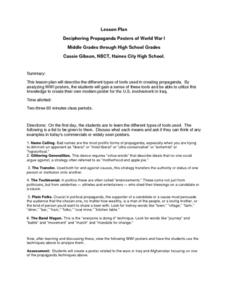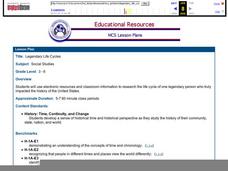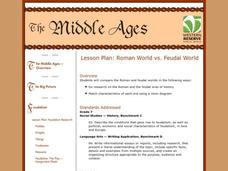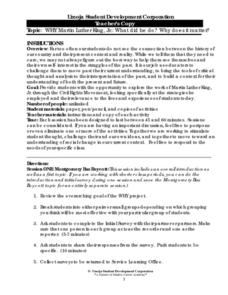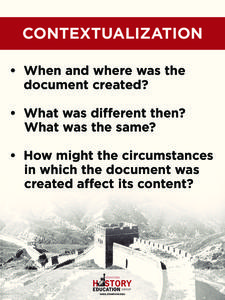Curated OER
Deciphering Propaganda Posters of World War I
What strategies are employed when creating propaganda? Your young historians will learn about six different techniques utilized in the construction of political propaganda, particularly in the advertisements of World War I. The...
New York City Department of Education
Grade 11 Literacy in Social Studies: Research Paper
The lesson guides young academics through the steps in producing a 10-page research paper on any topic in American history. Historians begin by formulating a thesis and gathering resources, then move on to creating an outline, and end...
Curated OER
Legendary Life Cycles
Upper elementary historians research a legendary person who had an impact in the the history of the United States. Learners research the life of their person of choice, and construct a legendary timeline using computer software which...
Curated OER
Patriotic Symbols of the United States
Young historians take a close look at the most famous patriotic symbols of the United States and determine what they actually stand for. Symbols such as Uncle Sam, The Statue of Liberty, The Bald Eagle, and The Liberty Bell are studied....
Digital Forsyth
Restoration Project
In need of a neat idea that incorporates technology skills, art, and history? Young art historians will each select an old photograph from a local archive to digitally restore. The primary focus is to add color, clarity, and remake the...
Curated OER
Bears and Panthers Aplenty: Early Settlers Make a Home in Arkansas
Young historians research the Southwest Trail, which ran through Arkansas back in the 19th century. Pupils are divided into four groups. Each group researches a pioneer who blazed the Southwest Trail. Then, the group presents an oral or...
Curated OER
East Asia Country Project
Get your young historians thinking about East Asian culture and history during this partner research project, in which they analyze a variety of East Asian aspects to prepare for a presentation. After an initial "what do we already know"...
iCivics
Drafting Board: Electoral College
Should the president of the United States be voted by the Electoral College or the popular vote? Your young historians will consider the pros and cons of the Electoral College, and make an argument using reasons and evidence provided in...
Huntington Library
Religion & Spirituality - Exploring the California Missions
The California missions were built with the hope of converting the local Native Americans to Catholicism, but exactly how different were their beliefs to begin with? Through analysis of a series of primary source documents, young...
Northeastern Educational Television of Ohio, Inc.
Roman World vs. Feudal World
Young historians compare the major features of the Roman and feudal worlds, such as religion, social hierarchy, and political tenets, using online resources and group discussion.
Umoja Student Development Corporation
Martin Luther King, Jr.: What Did He Do? Why Does It Matter?
Young historians examine the work of Martin Luther King Jr. by reading and answering questions about the Montgomery Bus Boycott, the Albany Movement, the Birmingham and Chicago campaigns, and the Memphis Sanitation Worker's Strike.
Stanford University
Contextualization
Part of a series of posters designed to be used with a unit fostering the skills needed to read like a historian, this template models the questions researchers need to ask to contextualize a primary source document.
Stanford University
Corroboration
How do historians corroborate the information in a primary source document? They use the questions features on this poster!
Daughters of the American Revolution
Lesson 2: How Do We Determine the Value of Education?
Have women always had the same educational opportunities as their male counterparts? Young historians read an 1819 essay by Emma Willard on the state of female education in the 19th century before discussing their views regarding women's...
Annenberg Foundation
Evaluating Evidence
Was the Civil War fought only due to slavery? Using an interactive web tool, scholars investigate the four main causes of the Civil War. Gathering evidence and data to support their claims, they present a final statistical breakdown...
Teaching Tolerance
Act Up! Drama for Justice
A lesson turns young historians into playwrights to understand and speak out against social injustice. Pupils work individually or in groups to write and perform monologues that deliver personal messages on social justice. Writers then...
Curated OER
Western Civilizations, Chapter 12: The Civilization of the Renaissance
If you can't take your western civilization class to the Renaissance Faire, try this online resource to give them an idea of this era and others! While designed to accompany the Western Civilizations text, this tool can be utilized...
Curated OER
Western Civilizations, Chapter 16: Scientific Revolution
Engage your historians in the Scientific Revolution with a collection of interactive tools. This section outlines the Scientific Revolution and its significance within the context of the Renaissance. Scholars use the Chrono-Sequencer to...
Curated OER
Chapter 28: Red Flags and Velvet Revolutions: The End of the Cold War, 1960-1990
Set your historians up for testing success using this interactive flashcard tool. It is one of many learning strategies offered in this thorough online resource. Although designed for use with a text, the site is valuable independently....
Curated OER
Invaders and Settlers: The Vikings
Introduce your young historians to the amazing Vikings! This presentation provides information on the culture, travels, rule, religion, and tools used by the Vikings. After each 3-5 slide section are slides containing compression...
Judicial Learning Center
The Constitution and Rights
What's the right way to teach young historians about the Bill of Rights? Many an instructor has asked this question when pondering lesson plans over the US Constitution. The Constitution and Rights is a nifty resource that provides a...
K20 Learn
Bavaria Has Issues...Experimental Components
New ReviewDo you want to be a detective by analyzing situations? An engaging lesson provides young historians with the tools to help them understand the difference between data types and how to analyze them to draw conclusions. Scholars complete...
DocsTeach
Prequel to Independence
It's about time! Young historians use primary sources to create a timeline of events leading to American Independence. The fast-paced activity is designed to be used at the end of a unit on the Revolutionary War or as an assessment tool....
University of California
Migration of Early Humans: Evidence and Interpretations
While much of prehistory is cloaked in mystery, ancient ancestors left evidence in DNA, languages, and materials from their time. Using photographs of items such as cave paintings and ancient tools, as well as maps of linguistic patterns...


